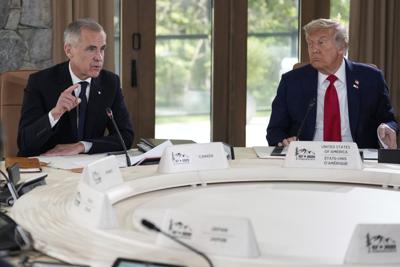U.S. President Donald Trump made clear on Friday that his administration hasn’t been focused on reaching a tariff deal with Canada. This explains Prime Minister Mark Carney’s desire to manage expectations as the clock runs out on the Aug. 1 deadline.
Our government is to be commended for its efforts to secure tariff relief, and should work with impacted sectors, but the time’s come for Canada to shift our strategy to preserving and extending the United States-Canada-Mexico Agreement (USMCA).
Some may object to the use here of the acronym USMCA rather than CUSMA — which lists Canada first in the agreement — but the practical reality is the USMCA is and has always been an “America First” trade deal in every sense of the term.
The USMCA was Trump’s initiative and a major achievement of his first term — and it must be successfully reviewed and extended in his second. Without exaggeration, the future of the North American continental economy depends on it.
This is particularly true for Canada. Despite there being U.S. tariffs on certain Canadian goods, the USMCA continues to be our most important trade and investment agreement. That’s why it must be Prime Minister Mark Carney’s top trade priority.
For one, Trump has exempted USMCA-compliant goods from some of his tariffs. Estimates vary, but approximately 80 per cent of Canadian exports are still able to enter the U.S. duty free. This represents a crucial competitive advantage.
Apart from Mexico, our other USMCA partner, no country is benefiting from a comparable tariff exemption. Every agreement Trump has announced to date has involved a baseline tariff, many having additional national security tariffs.
Without the USMCA and the exemption it provides, all Canadian exports would be subject to the full force of Trump’s tariffs. The effective tariff rate on Canadian goods would spike dramatically to levels that would be catastrophic for our economy.
Extending the USMCA might also achieve relief for those sectors which are, or could soon be, subject to national security tariffs. Even if he won’t reverse course, Trump could expand his USMCA exemption to cover a wider range of Canadian goods.
A second reason to prioritize the USMCA is that if we lose our preferential access to the U.S. — which goes beyond tariff treatment — Canada’s value as an international market would decline sharply, undermining any attempt at trade diversification.
Delegations of business leaders and government officials from other G20 countries have repeatedly warned that Canada’s commercial relationship with their countries would be severely impacted by a breakdown in Canada’s relationship with the U.S.
Third, the USMCA isn’t just a tariff deal, it’s a comprehensive agreement. It contains 34 chapters covering everything from nontariff barriers to financial services, procurement, investment, telecoms, digital trade, labour, competition policy and IP.
If the USMCA were allowed to expire, Canada would be forced to negotiate replacement provisions — painfully, issue by issue, potentially over many years. Canadian businesses would be paralyzed by legal and regulatory uncertainty in the interim.
The USMCA’s final chapter provides for the mandatory review of the agreement every six years, with the first of these reviews set to happen next year. Unless all three countries agree to extend it, the USMCA will terminate in the year 2036.
Worse, a failure to extend the agreement next would mean that between 2026 and 2036, Canada, the United States, and Mexico would be forced to undertake a series of annual reviews until either the USMCA is extended, or it expires.
U.S. business leaders strongly support the USMCA being extended and are prepared to work alongside Canadian and Mexican counterparts to push for it, and, crucially, believe the political will exists among both Republicans and Democrats.
Trump has already directed the U.S. trade representative to begin preparations for the USMCA review by undertaking public consultations, assessing the impact of the agreement and reporting to the appropriate congressional committees.
Prime Minister Carney should issue a similar directive to Canada’s chief trade negotiator. He should empower them to draw resources from across government and engage directly with the private sector to ensure we’re ready for the review.
Short-term tariff relief was worth seeking and more should be done to help impacted sectors, but the extension of the USMCA for a longer-term must be Canada’s top trade policy priority given its importance to our entire economy.Â
Error! Sorry, there was an error processing your request.
There was a problem with the recaptcha. Please try again.
You may unsubscribe at any time. By signing up, you agree to our and . This site is protected by reCAPTCHA and the Google and apply.
Want more of the latest from us? Sign up for more at our newsletter page.



























To join the conversation set a first and last name in your user profile.
Sign in or register for free to join the Conversation